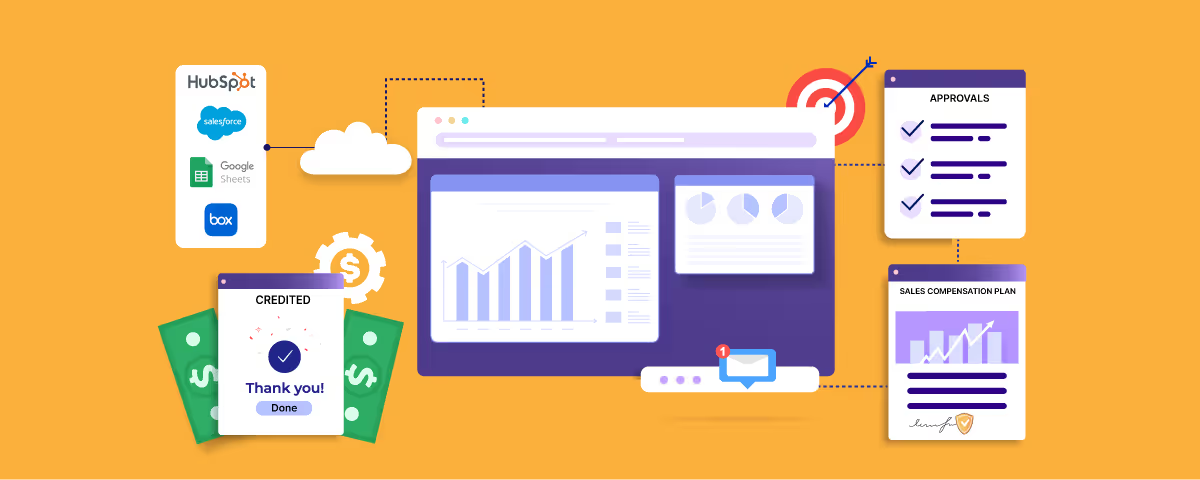The Ultimate Guide to Sound Compensation Plans & How They Can Boost Your Business's Success

A sound compensation plan is a strategy for compensating employees that is fair, competitive, and aligned with the organization's goals and objectives. Basically, a sound compensation plan is a useful strategy for compensating employees that can benefit both employees and the organization. It can help to attract and retain talent, motivate employees, align performance and rewards, ensure equity, promote organizational goals, and enhance financial stability.
A well-designed compensation plan can have several benefits for both employees and the organization, including:
- Attracting and Retaining Talent: A sound compensation plan can help an organization attract and retain top talent by offering competitive pay and benefits. This can give the organization a competitive advantage in the job market and reduce the costs associated with employee turnover.
- Motivating Employees: An effective compensation plan can motivate employees to perform at their best by providing incentives and rewards for good performance. This can improve productivity and drive business results.
- Aligning Performance and Rewards: A sound compensation plan should be closely tied to an employee's performance. This helps to ensure that rewards are given to those who are performing well and can serve as a motivation for employees to continually improve their performance.
- Ensuring Equity: A compensation plan should be fair and equitable, ensuring that employees are paid fairly for the work they perform. This can improve employee morale and engagement and reduce the risk of discrimination or pay disparities.
- Promoting Organizational Goals: A well-designed compensation plan can align with an organization's goals and objectives, such as promoting teamwork, innovation, or customer service. This can help to create a culture that supports the organization's mission and values.
- Enhancing Financial Stability: A sound compensation plan can help to control labor costs and enhance financial stability by providing a structured approach to compensation that is consistent across the organization.
How to Create an Ideal & Effective Compensation Plan for Your Business
Creating an ideal and effective compensation plan for your business requires a strategic approach that considers your business goals and objectives, market data, incentives and benefits, and aligning performance management with compensation. Communication and monitoring are also critical to ensure the compensation plan remains effective over time.
Here are some steps you can take to design a compensation plan that aligns with your business goals and objectives:
- Define Your Business Goals and Objectives: Start by defining your business goals and objectives, as these will help guide the development of your compensation plan. Consider factors such as your company's growth objectives, competitive position, and financial resources.
- Conduct a Job Analysis: Conduct a job analysis for each role in your organization to identify the responsibilities, required skills and qualifications, and the market rate for similar roles in your industry. This will help you determine appropriate salary ranges for each position.
- Develop Salary Structures: Develop salary structures based on the market rate for each position and your business goals and objectives. Consider factors such as industry standards, job complexity, and level of experience required.
- Determine Incentives and Benefits: Consider the incentives and benefits you want to offer to attract and retain top talent. These could include bonuses, profit-sharing, stock options, health benefits, retirement plans, and other perks.
- Align Performance Management with Compensation: Develop a performance management system that aligns with your compensation plan. This could include setting performance goals, conducting regular performance reviews, and tying compensation to performance.
- Communicate with Employees: Communicate the compensation plan and performance management system clearly to employees. Ensure they understand the compensation structure and how their performance impacts their compensation. This will help to create a culture of transparency and fairness.
- Monitor and Adjust: Monitor the effectiveness of your compensation plan regularly and adjust it as needed to ensure it remains competitive and aligns with your business goals and objectives.
The Different Types Of Compensation Plan You Should Consider
There are several types of compensation plans that you can consider for your business. Each has its own advantages and disadvantages, and you should choose the plan that best aligns with your business goals and objectives. Here are some of the most common types of compensation plans:
.avif)
- Base Salary: A base salary plan is a fixed amount of compensation paid to employees on a regular basis. This is the most common form of compensation and provides employees with a stable source of income.
- Hourly Wages: Hourly wages are a form of compensation in which employees are paid a fixed amount for each hour they work. This is often used for hourly or part-time employees.
- Commission: A commission plan is a form of compensation in which employees are paid a percentage of the sales they generate. This can be a powerful incentive for sales roles and can help align sales performance with compensation.
- Bonuses: A bonus plan is a form of compensation in which employees are paid a one-time bonus based on their performance or the performance of the company. This can be a powerful incentive for employees to perform well.
- Profit-Sharing: Profit-sharing plans are a form of compensation in which employees receive a share of the company's profits. This can be a powerful incentive for employees to work toward the company's success.
- Stock Options: Stock options plans are a form of compensation in which employees receive the option to purchase company stock at a set price. This can provide a powerful incentive for employees to work towards the company's success and aligns their interests with those of the company.
- Equity Compensation: Equity compensation plans are a form of compensation in which employees receive ownership in the company, such as stock or stock options. This can provide a powerful incentive for employees to work towards the company's success and aligns their interests with those of the company.
How to Implement Your Sound Compensation Plan Successfully & Ensure Compliance?
Implementing a sound compensation plan requires clear communication, effective training, compliance with laws and regulations, and ongoing monitoring and measurement. Follow these steps to ensure that your compensation plan is successful and fair for all employees.
Here are some steps to follow to ensure that your compensation plan is implemented successfully and compliantly:
Communicate the Plan
Before implementing the plan, communicate it clearly to all employees. Explain how the plan works, how it will be measured, and what employees need to do to earn incentives and bonuses. Use different communication channels to reach all employees and ensure they understand the plan.
Train Your Managers
Provide training to your managers on how to effectively communicate the compensation plan to their team members. Ensure they understand how the plan works, how to calculate payouts, and how to manage employee expectations. Managers play a critical role in ensuring that the plan is implemented fairly and consistently across the organization.
Ensure Compliance
Ensure that your compensation plan complies with local, state, and federal laws and regulations. Review your plan regularly to ensure it remains compliant and make necessary changes as required. Additionally, establish clear procedures for managing grievances and addressing employee complaints related to the plan.
Monitor and Measure
Regularly monitor and measure the effectiveness of your compensation plan. Review data on employee engagement, retention, and productivity to assess if the plan is achieving its objectives. Use this information to make data-driven decisions on how to improve the plan.
How Technology Can Help Improve the Efficiency of Your Sound Compensation Plan?
Leveraging technology can help improve the efficiency of your sound compensation plan by streamlining data management, automating processes, ensuring compliance, providing data analytics, and improving employee engagement. By embracing technology, you can enhance the accuracy and effectiveness of your compensation plan, leading to a more engaged and productive workforce.

Technology can help improve the efficiency of your sound compensation plan in several ways, including:
- Streamlining Data Management: Using a compensation management software solution can help you streamline your data management processes, ensuring accurate and up-to-date information on employee compensation. This will enable you to track performance metrics, benchmark your compensation against industry standards, and identify any areas where you need to make adjustments.
- Automating Processes: Automating compensation processes, such as calculating incentive payouts and bonuses, can help reduce errors and save time. Compensation management software can automate these processes, freeing up your HR team's time to focus on strategic initiatives.
- Ensuring Compliance: Technology can help you ensure compliance with local, state, and federal laws and regulations by providing built-in compliance checks and alerts. Additionally, the software can help you stay up to date with changes to regulations, so you can quickly adjust your compensation plan if needed.
- Providing Data Analytics: Compensation management software can provide powerful data analytics tools, enabling you to analyze data on employee compensation and performance, identify trends, and make data-driven decisions.
- Improving Employee Engagement: Technology can also help improve employee engagement with your compensation plan by providing employees with easy access to their compensation data and empowering them to track their progress toward earning incentives and bonuses.
Conclusion
A well-designed compensation plan can attract top talent to your organization and help you retain your current employees. Competitive salaries and benefits packages can differentiate you from other employers and increase your chances of hiring and retaining the best candidates. A sound compensation plan can also motivate your employees to perform at their best by linking their performance to incentives and bonuses. This can help improve productivity, efficiency, and quality of work.
A compensation plan that is fair, transparent, and linked to employee performance can also help improve employee engagement. Employees who understand how their pay is calculated and how it relates to their performance are more likely to feel valued and engaged in their work.
Also, it can enhance your organization's overall performance by aligning employee incentives with company goals. This can help improve collaboration and teamwork, leading to better overall results.
Find out how Compport can help you manage all your Compensation Management process, book a demo today!
%2520(6)%2520(2).avif)
Frequently Asked Questions
Q1. What is a sound compensation plan?
A sound compensation plan is a fair, competitive, and goal-aligned strategy for compensating employees that can benefit both employees and the organization.
Q2. How can a compensation plan attract and retain talent?
A sound compensation plan can attract and retain talent by offering competitive pay and benefits, giving the organization a competitive advantage and reducing employee turnover costs.
Q3. What is the importance of aligning performance and rewards in a compensation plan?
Aligning performance and rewards ensures that rewards are given to those who perform well, motivating employees to continually improve their performance.
Q4. How does a compensation plan promote organizational goals?
A well-designed compensation plan can align with organizational goals and objectives, promoting teamwork, innovation, or customer service, and creating a culture that supports the organization's mission and values.
Q5. How does a compensation plan enhance financial stability?
A sound compensation plan helps control labor costs and enhances financial stability by providing a structured approach to compensation that is consistent across the organization.


%20(49).png)
%20(48).png)
%20(47).avif)
